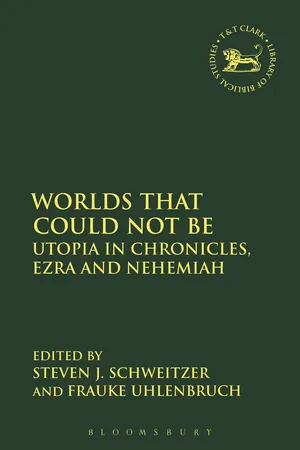
Worlds that Could Not Be
Utopia in Chronicles, Ezra and Nehemiah
- 208 pages
- English
- PDF
- Available on iOS & Android
Worlds that Could Not Be
Utopia in Chronicles, Ezra and Nehemiah
About this book
The idea of Utopia was first made current and popular by Sir Thomas More with the publication of his book by the same name in 1516. The 'no-place' that was created has had a fantastic reception history, which makes its application to the biblical books of Nehemiah, Ezra and Chronicles as vibrant as the current scholarship which is ongoing into the Renaissance term and its implications. The essays in this collection take different approaches to the question: are there proto-utopian elements in the three books from the Hebrew Bible? Methodological considerations are to be found, but each essay also moves beyond the methodological constraint to raise the hypothetical question of 'what if?' in different ways. The essays evaluate the potential, and pitfalls, of reading Biblical books as (proto-)utopian. Topics include how utopia construct intricate counter-realities, and how to tell whether a proposal diagnosed as 'utopian' from a modern point of view is meant to motivate its audience to political action. Case studies which read aspects of Chronicles, Ezra and Nehemiah as potential utopian traits include the restoration project of Ezra-Nehemiah and the rejection of foreign wives, utopian concerns in Chronicles, as well as the empire's role in writing a putative utopia, and King Solomon as a utopian fantasy-king.
Frequently asked questions
- Essential is ideal for learners and professionals who enjoy exploring a wide range of subjects. Access the Essential Library with 800,000+ trusted titles and best-sellers across business, personal growth, and the humanities. Includes unlimited reading time and Standard Read Aloud voice.
- Complete: Perfect for advanced learners and researchers needing full, unrestricted access. Unlock 1.4M+ books across hundreds of subjects, including academic and specialized titles. The Complete Plan also includes advanced features like Premium Read Aloud and Research Assistant.
Please note we cannot support devices running on iOS 13 and Android 7 or earlier. Learn more about using the app.
Information
Table of contents
- Cover
- Half-title
- Title
- Copyright
- Contents
- Preface and Acknowledgments
- List of Contributors
- Abbreviations
- Introduction
- Part I: Testing Utopia as a Contemporary Method in Biblical Studies
- Part II: After Exile, Under Empire: Utopian Identity Negotiations in Ezra–Nehemiah and Chronicles
- Part III: Searching for the Place: Theologies of Utopia
- Index of References
- Index of Authors